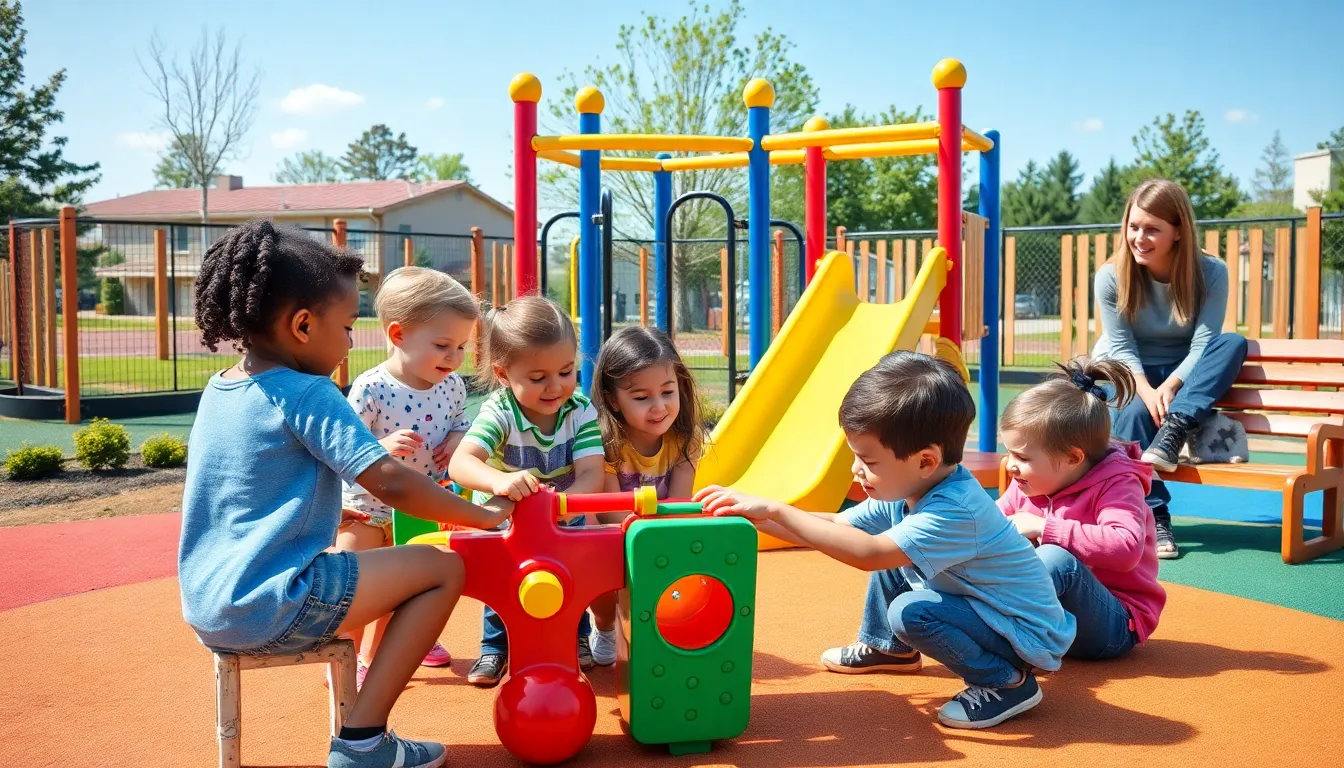Table of Contents
ToggleEvery parent faces the big question: when should their little ones start preschool? It’s a rite of passage that can feel like a game of musical chairs. One minute, they’re your tiny sidekick, and the next, they’re off to learn the art of finger painting and snack time negotiations.
Understanding Preschool Age
Preschool typically caters to children aged 3 to 5 years. Children often begin at age 3, as this is when many exhibit readiness for social interaction and structured activities. School readiness signs include interest in group play, language development, and basic self-care skills.
Parents might consider various factors when determining the right age for their child. For example, a child’s temperament can influence their comfort level in a preschool setting. Extroverted children may adapt more easily than introverted peers.
Preschool programs offer different age brackets, which can affect enrollment decisions. Most preschools divide classes into age-appropriate groups, often based on birth dates. Children turning 3 by a particular date can usually enroll that year.
Developmental milestones also play a significant role in age determination. By age 4, many children express more curiosity and engage in imaginative play. At this age, they’re often more equipped to handle classroom routines.
Social skills become increasingly important as children approach preschool age. Those who start at age 5 may experience benefits, too, including better readiness for kindergarten. For parents, the decision often hinges on how prepared their child feels for this new chapter.
Parents should research local preschool options, as programs vary widely. Many institutions offer flexible start dates and developmental assessments. This information can guide families in making informed choices about preschool enrollment.
Factors Influencing Preschool Start Age

Several factors play a critical role in determining the appropriate age for a child to start preschool. Parents often assess these influences alongside their child’s unique circumstances.
Developmental Readiness
Developmental readiness encompasses various skills that indicate a child’s preparedness for preschool. Language abilities significantly influence communication with peers and teachers. Children who display a desire for group play and can express their thoughts often benefit from early enrollment. Additionally, self-care skills such as using the restroom without assistance make transitions smoother. Cognitive milestones, including attention span and curiosity, also factor in. By age 4, many children demonstrate the ability to engage in imaginative play and follow basic instructions, making them well-equipped for the structured environment of preschool.
Family Dynamics
Family dynamics can greatly affect a child’s preschool start age. Parents evaluate their work schedules and childcare options before making decisions. In homes where both parents work, early preschool enrollment often becomes necessary for childcare support. Siblings can also influence timing; families with older children may enroll younger siblings earlier to align routines. Moreover, cultural beliefs surrounding education shape perspectives on when to start preschool. Parents who prioritize early education see value in early socialization and development, prompting them to consider earlier enrollment.
Variations by Region
Factors affecting preschool enrollment vary widely based on local regulations and cultural differences.
Local Regulations
Local regulations dictate the age at which children may start preschool. Many states in the U.S. require children to be at least three years old to participate, while some programs accept children from 2.5 years. Regulations may differ even within states, as certain districts establish specific age cutoffs based on birth dates. Licensing requirements often influence preschool eligibility, determining whether programs cater to younger or older children. Awareness of these regulations helps parents make informed decisions regarding enrollment.
Cultural Differences
Cultural beliefs shape preschool education expectations. In some cultures, early childhood education emphasizes structured learning, leading parents to enroll children at a younger age. Other cultures prioritize play-based learning, allowing children to start preschool at a later age. Family-oriented cultures may favor keeping children at home longer for nurturing before formal education begins. Understanding these cultural differences aids parents in selecting the most suitable preschool experience for their children.
Benefits of Early Preschool Enrollment
Early preschool enrollment offers several advantages that can enhance a child’s development. Social skills often improve significantly when children interact with peers. Engaging in group activities fosters teamwork and communication abilities from a young age.
Cognitive development receives a boost in structured learning environments. Exposure to new vocabulary and concepts during preschool can enrich a child’s language skills. Basic math and problem-solving skills often emerge through guided play and activities.
Emotional growth flourishes as children learn to navigate friendships and relationships. They develop empathy and conflict resolution skills while resolving playground disagreements. Self-confidence increases when children successfully overcome challenges in a supportive setting.
Routine familiarity also plays a key role in easing the transition to future schooling. Early exposure to structured schedules prepares children for the rigors of kindergarten and beyond. Familiarity with classroom dynamics fosters a sense of security in a learning environment.
Furthermore, parents gain valuable insights into their child’s learning style and interests. Regular communication with teachers supports proactive developmental interventions. Observations made by educators often guide families in supporting their child’s progress at home.
Deciding to enroll a child in preschool early can pave the way for a successful educational journey. Positive experiences during these formative years often set the stage for a lifelong love of learning. By choosing to prioritize early education, parents create a strong foundation for their child’s academic and social future.
Challenges of Starting Preschool Early
Parents often encounter difficulties when deciding to enroll their children in preschool at an earlier age. Younger children might experience separation anxiety, impacting their adjustment to the new environment. Emotional readiness plays a significant role in this transition, as some kids struggle to cope with being away from home.
Social skills also present challenges for those who start preschool early. While peer interactions can enhance development, many young children may find it tough to engage with older classmates. This mismatch can lead to feelings of frustration or isolation, affecting their confidence in social situations.
Cognitive development is another concern. Children who are not fully prepared for structured learning may feel overwhelmed by the curriculum. Basic skills like language abilities and problem-solving must align with preschool expectations to ensure a smoother experience. Otherwise, the pressure can hinder their growth and enthusiasm for learning.
Family dynamics cannot be overlooked. Parents balancing work schedules might push for early enrollment without considering their child’s unique temperament. Challenges arise when parental support diminishes, leading to a potential lack of nurturing at home.
Cultural beliefs contribute to the complexity of this decision as well. Some families may prioritize early education, while others may value play-based learning and exploratory experiences. Navigating these expectations may create conflict between parents’ desires and children’s needs.
Lastly, regional regulations impact enrollment decisions. Variability in age cutoffs across programs can confuse parents trying to adhere to guidelines while ensuring their child’s readiness. It’s crucial for them to assess local options and communicate with educators to find the best fit for their child’s individual needs.
Determining the right age for a child to start preschool is a nuanced decision that requires careful consideration. Each child develops at their own pace and factors like temperament and family dynamics play a crucial role in this choice. Parents should weigh the benefits of early enrollment against potential challenges, ensuring their child is emotionally and socially ready for this new experience.
Researching local preschool options and understanding regional regulations can help families make informed decisions. By focusing on their child’s unique needs and readiness, parents can set the stage for a positive preschool experience that fosters growth and prepares them for future educational endeavors.





